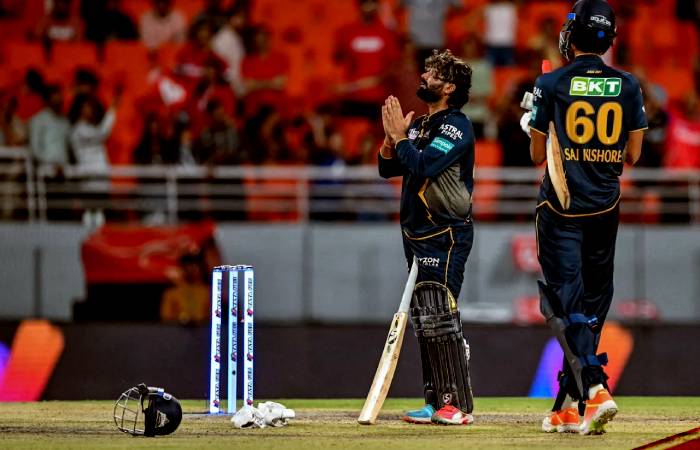Sports View More
IPL 2024: Yashasvi Jaiswal helps RR beat MI easily
Rajasthan Royals, RR, have been terrific this season IPL 2024, with their consistency in beating big sides. At Jaipur, they have changed their fortunes from…
IPL 2024: GT manages to win with great difficulty
GT have been able to win the IPL trophy in their first season and reach final in their second season. But with all the transfer…
IPL 2024: KKR pulls off a last ball thriller against RC
KKR have been able to cross the line in this season, IPL 2024, in more close matches than previous season. Against RCB, they have pulled…
IPL 2024: SRH again score above 250 and win handsome
SRH with the inclusion of Travis Head, Abhishek Sharma and Heinrich Klaasen along with Pat Cummins have changed their mindset. From being a 140-160 batting…
IPL 2024: LSG wins rather easily against CSK
LSG have played against a tough opposition like CSK at their home ground on 19th April. They won the match rather easily due to the…
Entertainment View More
Jai Hanuman to release worldwide in IMAX 3D screens as well
The Visionary director Prasanth Varma has become a household name across the country after the Pan India sensation Hanu-Man. The creative director is bringing us…
Senior Malayalam actor Siddhque joins Chiyaan Vikram’s Veera Dheera Sooran
Chiyaan Vikram, celebrated for his multifaceted and captivating performances, is poised to enthrall cinema aficionados once again with his upcoming adrenaline-pumping action thriller, “Veera Dheera…
Kajal Aggarwal reminds us she is still the “Chandamama”
Kajal Aggarwal has become famous with Chandamama film in Telugu Cinema post her debut in Lakshmi Kalyanam. She has become a most favorite damsel of…
Mahesh Babu supports SRH and his new look is dashing
Mahesh Babu, the reigning Superstar of Telugu Cinema, has decided to become ambassador of Hyderabad IPL Franchise, SRH. He met the cricketers playing in SRH…
Keethy Suresh looks extremely attractive in saree
Keerthy Suresh has made a name for himself in South Cinema. She has become known for her acting skills, looks and style post a classic…
Business View More
Stock Markets Update: Indices maintain gains on 22nd April
Stock Markets maintained their gains on 22nd April, 2024. After putting an end to consecutive losses on 19th April, Stock Markets have maintained gains, in…
Stock Markets Update: Indices recover well on 19th April
Stock Markets recover after four consecutive sessions of losses on 19th April, 2024. Investors did not find big enthusiasm in the starting moments of the…
Stock Markets Update: Indices crash again on 18th April
Stock Markets crashed again after slight recovery on 18th April, 2024. Investors have started this session on a high above the previous closing. But International…
Stock Markets Update: Indices crash further on 16th April
Stock Markets crashed further after previous two sessions on 16th April, 2024. Investors did not find any kind of respite after two sessions of losses.…
Stock Markets Update: More than Rs.5 lakh crores in one session
Stock Markets have crashed once again on 15th April, 2024. The news about probable war in Gulf and fears of retaliation by Israel after Iran…
Stock Markets Update: Indices crash post Eid holiday
Stock Markets After a session with huge gains on 10th April, indices have ended up with huge losses on Friday post Eid holiday on 12th…
Stock Markets Update: BSE crosses and settles above 75,000 mark
Stock Markets ended at all-time record highs on 10th April 2024. Investors have kept investing in big stocks throughout the day. Internationally Asian Stock Markets…
Stock Markets Update: Indices end with marginal losses
Stock Markets lost gains at lifetime highs on 09th April 2024. Markets started off with huge gains touching new lifetime highs. At this moment, Investors…
Stock Markets Update: Indices touched new lifetime highs
Stock Markets ended with huge gains on 08th April 2024. Investors have invested huge in big stocks like Reliance, L&T, Mahindra & Mahindra, Axis Bank…
Latest News
Jai Hanuman to release worldwide in IMAX 3D screens as well
The Visionary director Prasanth Varma has become a household name across the country after the Pan India sensation Hanu-Man. The creative director is bringing us…
Senior Malayalam actor Siddhque joins Chiyaan Vikram’s Veera Dheera Sooran
Chiyaan Vikram, celebrated for his multifaceted and captivating performances, is poised to enthrall cinema aficionados once again with his upcoming adrenaline-pumping action thriller, “Veera Dheera…
IPL 2024: Yashasvi Jaiswal helps RR beat MI easily
Rajasthan Royals, RR, have been terrific this season IPL 2024, with their consistency in beating big sides. At Jaipur, they have changed their fortunes from…
Kajal Aggarwal reminds us she is still the “Chandamama”
Kajal Aggarwal has become famous with Chandamama film in Telugu Cinema post her debut in Lakshmi Kalyanam. She has become a most favorite damsel of…
Mahesh Babu supports SRH and his new look is dashing
Mahesh Babu, the reigning Superstar of Telugu Cinema, has decided to become ambassador of Hyderabad IPL Franchise, SRH. He met the cricketers playing in SRH…
Keethy Suresh looks extremely attractive in saree
Keerthy Suresh has made a name for himself in South Cinema. She has become known for her acting skills, looks and style post a classic…
Rajinikanth to be Coolie for Lokesh Kanagaraj
Superstar Rajinikanth has grown into a phenomenon as a commercial cinema star in Indian Cinema. His following among movie lovers is so high and amazing…
Stock Markets Update: Indices maintain gains on 22nd April
Stock Markets maintained their gains on 22nd April, 2024. After putting an end to consecutive losses on 19th April, Stock Markets have maintained gains, in…
Amitabh Bachchan’s first look as Ashwatthama from Kalki 2898 AD rocks internet
Amitabh Bachchan is one of the biggest acting legends of Indian Cinema and he is playing important supporting roles in big films, these days. He…
IPL 2024: GT manages to win with great difficulty
GT have been able to win the IPL trophy in their first season and reach final in their second season. But with all the transfer…
IPL 2024: KKR pulls off a last ball thriller against RC
KKR have been able to cross the line in this season, IPL 2024, in more close matches than previous season. Against RCB, they have pulled…





















